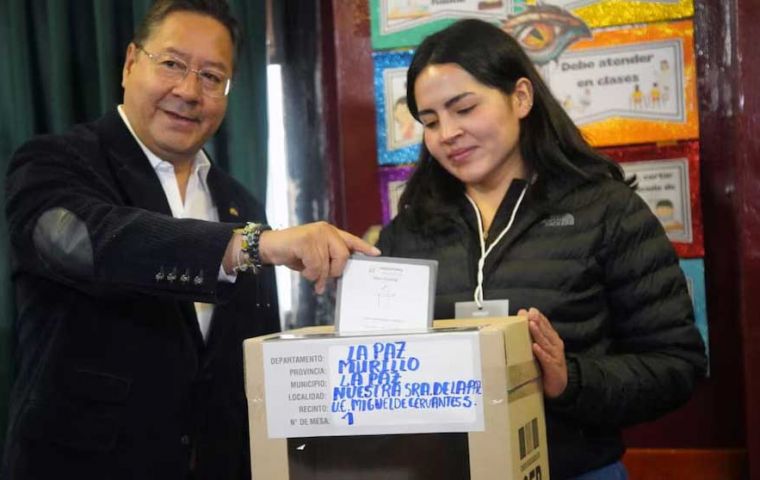MercoPress. South Atlantic News Agency
Bolivia headed for runoff between rightwing candidates
 Arce was booed as he turned up at the polling station
Arce was booed as he turned up at the polling station Right-wing candidates Rodrigo Paz Pereira and former President Jorge Tuto Quiroga advanced Sunday to an unprecedented runoff after the elections in Bolivia. Preliminary results showed Paz Pereira in front with 32.2% of the vote and Quiroga in second place with 26.9%, which marks a significant shift in Bolivian politics, as it signals the end of two decades of leftist rule by the Movement for Socialism (MAS) party, led by former presidents Evo Morales Aymá and Luis Arce Catacora. The runoff election is scheduled for Oct. 19.
With 92.4% of the votes counted, Paz Pereira, of the Christian Democratic Party (PDC), leads the count with 32.2% of the votes, while Quiroga (2001-2002), of the Libre alliance, had 26.9%, according to the Preliminary Election Results System (Sirepre) of the Supreme Electoral Tribunal (TSE).
“A long night of two decades has ended,” Quiroga reacted after the preliminary results were announced, in which the ruling Movement for Socialism (MAS) would be out of the second round.
Paz, 57, won a surprise first place that was not anticipated a week ago by the polls.
This will be the first time that Bolivia will have a second round, a possibility contemplated in the Constitution in force since 2009, if none of the candidates obtains more than 50% of the valid votes or a minimum of 40% with at least a ten-point lead over the next candidate.
Opposition businessman Samuel Doria Medina, of the Unidad alliance, came in third with 19.9%, followed by Senate Speaker Andrónico Rodríguez of the Popular alliance, with 8.2%.
The candidate of the ruling Movement Toward Socialism (MAS), Eduardo del Castillo, had 3.1%, barely above the percentage required to maintain the party's legal status.
The son of Spanish mother Carmen Pereira and former Bolivian president Jaime Paz Zamora (1989-1993), Paz Pereira was born in Santiago de Compostela in 1967 and spent his childhood in several countries because his parents were persecuted during the military governments.
Quiroga was vice president between 1997 and 2001, when he assumed the presidency by constitutional succession after the resignation of then-President Hugo Banzer Suárez, who left office for health reasons. “Bolivia will change dramatically after these years that have been destructive, polarizing, full of persecution, and full of pain,” Quiroga said.
The results mark the departure of the left from power after two decades of the governments of Evo Morales (2006-2019) and Luis Arce, who will hand over the presidency on November 8 to the winner of the second round.
Morales did not participate in these elections due to a constitutional provision banning him from seeking any additional term in office. In that scenario, Morales campaigned for a null vote, albeit in vain.
The elections “took place peacefully, with isolated incidents that did not undermine the electoral process,” said TSE Chief Justice Óscar Hassenteufel.
A mob stoned and booed candidate Andrónico Rodríguez after he cast his vote in the political and union stronghold of former President Evo Morales, the Trópico de Cochabamba, where he is considered a “traitor” for distancing himself from the former ruler.
Both Andrónico Rodríguez and President Arce were notoriously booed as they turned up at the polling stations.




Top Comments
Disclaimer & comment rulesCommenting for this story is now closed.
If you have a Facebook account, become a fan and comment on our Facebook Page!